At Home in the Dark Read online
Page 2
“In school. I gotta go to work, Dad.”
“Oh, right. Sure, kid,” he said, pulling his feet back and off the ottoman, stuffing them into his loafers, fixing the front of his shirt, running his hand through his hair and standing up. “How is everything?”
“Good,” she said, slipping on her jacket, shrugging her handbag strap over her shoulder and pulling the car keys from her jeans pocket.
“Everything good at the restaurant?”
“Yep.”
“They make a great creamed spinach. It’s the nutmeg, you know. That’s the ticket.”
“I know.”
He put his hand on her shoulder, steering her to the front door. “Did you bring me my lasagna?”
“Yes, sir, I gave it to Princess. You saw when I got here.”
“Right. That’s your grandmother’s recipe, you know.”
“I know.”
“Old man Sorrentino had sticky fingers; he could steal your grandma’s rosary beads right out of her hand. You know that, right?”
She laughed. “We’ll go Sunday.”
“Good idea. With the peanut.”
She took her father and her six-year old daughter, Maria, to the restaurant every Sunday, every single Sunday since she’d moved him into this wretched place that cost her a small fortune and was supposedly one of the best group houses for people with dementia in all of New Jersey, not just in Belleville or Bloomfield—a big old house smelling faintly of old carpet and Pinesol and burnt onions and Mrs. Moskowitz’ Jungle Gardenia and someone’s adult Pamper and bad breath and wet dog, which was ridiculous because there was no dog allowed on the premises, not even to visit, which made no sense because it was a known fact that animals helped people with stress and there was enough stress in this place to choke a horse, her mother would have said. Her beautiful mother who had walked out on them when Lucinda was fifteen for a cop named Vinnie who worked in Brooklyn and it was hard to say which was worse—a firefighter’s wife leaving him for a cop or the fact that the cop was from Brooklyn. Not even counting the boat. Vinnie had a Criss Craft cabin cruiser, or a Criss Cross cabin cruiser, she wasn’t sure which, but it seemed to matter a great deal to her mother.
“She likes the pudding.”
“Who?”
“The peanut. She likes the pudding at Serendipity’s.”
“Sorrentino’s, dad.”
“At Sorrentino’s, right.”
“And it’s budino. Not pudding.”
He shrugged. “Budino . . . pudding . . . what the hell’s the difference?”
• • •
Lucinda rested her forehead against the steering wheel. It was icy. All of New Jersey was icy—the streets, the bare branches of the trees against the pale sky, her heart.
She couldn’t take care of him anymore. Not after the thing with the oven. Not after the thing with the car.
“You can’t take care of him anymore,” her aunt Angie said with defiance, feet planted, arms crossed over her breasts. “It’s enough. Soon he won’t know how to wipe his own ass,” she said.
Lucinda’s mouth opened.
“I can say that, he’s my brother,” Angie said. “What if he takes Maria in the car with him, what if he takes her to Bloomfield Center and loses her? Or drives to Philadelphia?”
Lucinda actually smiled. “Why would dad go to Philadelphia?”
“Oh, I don’t know,” Angie said, collapsing into a chair, sobbing, “Jesus Mary and Joséph, my Nicky, what a thing.”
“It’s a good place,” Reverend Father King said about the home. “It’s enough, Lucinda. This is a good place.”
She started the car.
• • •
“Como esta, Lucy?” José shouted over the din as she walked into Sorrentino’s crowded kitchen. Cooks and waiters, busboys and dishwashers jostled for position at sink and stove and counters, moving pots and pans and plates and food with the precision of the New York Yankees or possibly the New York City Ballet Company, she wasn’t sure which, and in the middle of the whole commotion stood José, stacking thick white plates on trays. José Conchola had been a busboy at Sorrentino’s since Lucinda had been coming there as a little girl. Sixty now, he knew all the regulars and they all knew him, a fixture; as faithful as their recipe for lasagna.
“I’m fine,” she said, “good.”
“How’s the papa?”
“The same.”
“The same is good,” Enrique said, lifting his eyes from a mountain of tomatoes he was chopping.
“You think?”
“I think, yes,” he said emphatically, waving the knife in his hand. “Change is fearful.” Enrique was proud of his English and liked to show off his extensive vocabulary, which wasn’t always the use of the correct word at the correct time. “With study no one will know I am from Puerto Rico,” he would say which brought down the house, or actually the kitchen.
“They will all think you are from Norway!” Simon, one of the dishwashers, shouted and everyone laughed.
If you cooked in Sorrentino’s kitchen, you spoke Spanish—Mexico, Puerto Rico, Guatemala—it didn’t matter which country—you just couldn’t work at Sorrentino’s as a chef if you were Italian. It was policy; a proclamation laid down years ago by the old man. “You hire an Italian to cook in your kitchen and they will change your recipe,” old man Sorrentino had said with disdain, “you hire a Mexican and they do exactly as you say.” The only Italian chef allowed to cook in that kitchen was Sorrentino’s nephew, Salvatore, who had gone to the Cordon Bleu of Naples, or whatever the hell was the equivalent and then worked in Manhattan in two restaurants that were supposedly very ladidah but too expensive for Lucinda to try, not even counting trying to get into the city and to the Upper East Side. Enrique told her a plate of gnocchi was $36.00. He’d taken his wife and daughter for her confirmation. “A veal chop cost more than a cheap suit! That is the expression, yes?” “Yes,” Lucinda answered, laughing. Carlos, one of Sorrentino’s sauté chefs, followed Salvatore around like a puppy but it was Lucinda’s take that the other guys in the kitchen thought Salvatore was full of himself. Chu Chu, the grill chef, called him un perro or un cerdo behind his back, which was a dog or a pig, which exasperated José—“you should not be offending the animals.” Part of it was jealousy. After all, he had a real education and real experience, although his gnocchi were not cloud pillows of perfection like Carlos made and his veal chop in a balsamic glaze didn’t get close to Chu Chu’s.
“We got a lot of reservations?”
“Only the old ones,” José said, grinning. “They come for the noon whistle,” he said smacking the swinging door with his hip and sailing out of the kitchen.
“Que mierda this noon meliodia?” Chu Chu asked.
“Speak English!” Enrique shouted.
• • •
It was not her intention to end up waiting tables and being pleasant to people who sent back their steak because “this isn’t rare, this is mooing,” or eating cloud pillows of gnocchi way too late at night, which couldn’t be good for her thighs but was good for her purse and her peace of mind. She’d been in line for the general manager position at Armstrong’s when they went out of business, in like four hours over some hush-hush crooked money transaction that stunk to high heaven, as her Aunt Angie put it, which happened the week after she’d put her father into “the big house” and Maria into Ridge Street School first grade. She’d been working at Armstrong’s for twelve years, from right after she graduated, married Marty, got pregnant, had the peanut Maria, and Marty got sick and then sicker and actually died—actually because who dies when they’re 36? A schtarker Jewish up-and-coming Immigration lawyer who could dance like Jimmy Cagney or maybe Mickey Rooney, and could actually sew a hem? And tell jokes like a Borscht Belt comic. And had basketball hands? Yes.
So, what the hell was she going to do with no job at Armstrong’s? How was she going to pay for everything? She had to call Chief Lang to find out about her dad’s pension and
insurance. And that Sunday they’d gone to Sorrentino’s for early dinner—her dad and Maria and Angie—and like a gift from the Gods, when Marco was cleaning off their table he told her that Rosa had quit that morning with no notice and the Sorrentino’s were hysterical looking for someone.
And Angie had come through for her like Justify winning the Triple Crown at Belmont. “I know how to baby sit,” she said to Lucinda, eyes narrowing, chin raised. “I baby sat you plenty, didn’t I? After your mother ran off into the night.”
Lucinda smiled. “It wasn’t in the night, Ang.” Ah, the age-old story of her mother running away with Vinnie.
“It’s a figure of speech, right? Did I step in and take care of you while your father spent days on that fire engine?”
“Yes, ma’am. You did.”
“Days, nights . . . all those hours, busting his ass.”
“Yes, ma’am.”
“So I’ll step in again. What’s the problem?”
“Well, your time . . . I don’t expect you to give up your life to take care of Maria for me while I’m hustling plates of red sauce.”
“And what am I supposed to do with my time, Missy? Dust? Play Mahjong?”
Lucinda laughed. “You don’t play Mah Jong.”
“Well, I could learn,” Angie said.
And because Etta and Bruno Sorrentino had known her practically since she’d been born and she’d worked there two summers when she was in high school and they needed somebody fast since Rosa had up and quit with no notice—a betrayal, Bruno had said, his lips pulled into a thin line like a guy in The Godfather—and because they were more than fair about working out hours with her and the rest of the wait staff so she could see her dad and her kid, she made her peace with it—she bought three white blouses and three pairs of black slacks and black sneakers and learned how to tie the stupid black tie. After all, she didn’t need to sing three verses of “I Need This Job” from “A Chorus Line” to know what was up—she would wait tables at Sorrentino’s.
• • •
The first time it happened was last fall. The lovely lull between lunch and dinner. Chu Chu put his feet up. Simon had a cigarette in the alley. They actually locked the front door from 3 to 5. They even turned off the wretched background music which was barely audible when the restaurant was full, but could make your teeth hurt when you could hear it—Italian crooners from the old days—which was okay every now and then but not night and day. Which was one of the songs that played over and over. And, how many times could you listen to Julius LaRosa singing “Eh Compari!”? Bruno was not interested in new music or any of the new devices that could bring music into the restaurant. “I am an old fashioned man, Lucinda; this is an old fashioned restaurant. Lei capisce?”
“I got it,” she said.
“Don’t make trouble with him,” her Aunt Angie said. “He’ll have us all bumped off.”
“Ang, you’re hysterical. The Sorrentino’s aren’t in the mob.”
“What’s a mob?” Maria asked.
“A group of people who are up to trouble,” Angie answered. “Who wants ice cream?”
It was so slight that she wasn’t even sure it had happened. She was outside in back during the lull. Maybe four o’clock, four thirty. It was everything you wanted an autumn afternoon to be—chill in the shade, warm in the dazzling sun, the leaves doing their red and gold thing. She was just standing there watching the sky, actually thinking about Marty running track at Rutgers, coming off the track and hugging her, all sweaty and laughing and she was already all dressed up to go to this tea. “I don’t even like tea,” she had said. “It’s a big deal to get invited to tea at the Dean’s,” Marty said. “Why?” “Because they’re coffee drinkers.” “You’re all sweaty.” “It’s sexy, huh?” he said. She closed her eyes.
The car hardly made any noise; Sal’s wife’s car. It slid up and he got out. If he leaned in to kiss Terry goodbye Lucinda missed it. Terry gave a little wave and Lucinda gave a little wave and the car made a U and took off and Sal walked past her with a “hey,” and she had a sweater draped over her shoulders and it had slipped off on one side and as he passed her he kind of propped it back up on her shoulder and his hand barely slid a little down her arm and his fingers moved across her breast. Across her breast. Right? He went in Sorrentino’s back door and she stood there.
The second time was the same sort of thing. Right before they unlocked the front door for dinner. The five o’clock whistle, José called it. She was tossing the hot half-sliced bread into the baskets. They sliced them half way through so the people could pull them the rest of the way letting off a tantalizing whiff of hot baked bread. Enrique had sliced the first batch of loaves and was on his way back to the oven. Salvatore was on his way to the stove holding a cupped handful of truffles and as he slid behind her he rubbed the front of his body against her ass. His cock was hard. It wasn’t a narrow kitchen. It’s not like he didn’t have plenty of room to get around her. And it’s not like she didn’t remember what a hard cock felt like. Son of a bitch. She dropped the bread she was holding and whipped around to look at him but he was already at the stove lecturing Chu Chu on sautéing truffles. She stood there.
“What’s up, Lucy?” José said.
“Nothing.”
Her heart was racing.
The third time he’d actually cupped her ass. It was in the dining room after they’d closed or at least weren’t going to serve anyone else. There were always stragglers. There was a boisterous family falling all over each other after many bottles of Montepulciano struggling to make it to the door. And in the corner booth sat Mr. Ruban with three cronies sipping Remy. Al Ruban was a regular. She wasn’t exactly sure who he was but she knew he was somebody. She wasn’t exactly sure if people were still connected but if they were, he was. She wasn’t interested in knowing. She knew José held him in high regard; he always got in even if he didn’t have a reservation, and when Salvatore had gone over to pay his respects he’d practically genuflected in front of the table. It was on Sal’s way back. José and Marco had picked up dirty dishes, glasses and silverware and were moving back into the kitchen, trays full. Lucinda bent over to get a tossed napkin they’d missed halfway hidden under the table cloth and as she bent to get it he was behind her cupping her ass. It must have looked as if he was helping her pick up whatever she was going for. His body must have blocked what he was doing with his hand, his fingers sliding to the middle of her ass and pushing. She practically fell getting back up and he made a big deal of saying, “Scuse, scuse,” and took off into the kitchen.
She held the crumpled napkin to her chest. She steadied herself. She walked slowly after him.
Simon and Pepe were washing pots and singing. José and Marco were laughing. Chu Chu was on his cell phone. There was no sign of Salvatore who must have been in the little closet office down the hall.
The door was open. He was sitting at the desk scribbling something on a piece of paper.
“What are you doing?” she said.
“I write tomorrow’s specials. I think the vongole with tomatoes.”
She took a breath. “No. What are you doing with me?”
“What am I doing with you?”
She was clutching the doorframe.
“With me. You had your hand on me.”
“What?”
“Don’t what. You had your hand on my ass.”
He stared at her.
“It isn’t the first time.”
He tilted his head. “Is silly to make a fuss.”
“A fuss? I’m making a fuss? What are you doing, Sal?”
“I want to fuck you.”
She could feel her heartbeat in her mouth.
“No one will know.”
Her stomach turned.
“Mr. Ruban wants his check, chica,” Enrique said from behind her.
She turned. “What?”
Enrique grinned at her. “Mr. Ruban. He wants to pay and leave you a boo coo tip because you
are the pinnacle of waitress in all of New Jersey. Yes?”
• • •
She didn’t tell anyone. She didn’t go to work for four days feigning a sinus infection. She took a lot of showers. She spent hours in a pew at Sacred Heart Cathedral. “Are you alright, Lucinda?” Reverend Father asked, cornering her in the parking lot by her car. “I’m okay, Father.” “Contemplating the sad state of the world, are we?” he said with a wry smile. She didn’t answer. “You can always talk to me about things, Lucinda. You know that. Okay?” Oh, sure, Father, she thought. You see, Salvatore wants to fuck me, and I’m not sure what to do because, you know, he’s Sorrentino’s nephew, and I’m sure it wouldn’t sit well with Etta and Bruno, or Sal’s wife, but what if they don’t believe me, so I’ve been hitting restaurants all over the hood with my resume, but it’s hard to find a job close to Maria’s school and to my dad and all . . . so what’s your advice, Father?
She read Maria a lot of stories. She ate a lot of cheesecake. She waxed the dining room table countless times. “What’s with you and the wax?” Angie said.
They had something for her at Costello’s but it was just lunches and they had something for her at the Corner Diner but you needed a place with a bar if you wanted big tips and the best drink in the diner was a chocolate shake.
She worked Thanksgiving. She worked Christmas. She worked in between. She had to. The neighborhood celebrated the holidays big time and Sorrentino’s was packed. Big tabs, big tips. The restaurant had a big tree in the front entrance, wrapped empty boxes under the tree, colored lights that flashed on and off strung behind the bar, the works. She stayed away from him. She didn’t put herself anywhere near him. He didn’t look at her. She didn’t look at him. Maybe it would be okay. Maybe it was over. Maybe she had made it up.
And then two days after Christmas when they closed the restaurant so the whole staff could have their big family dinner and she was there with her dad and Maria and Angie because how could she tell her family that they weren’t going to the family dinner? And there he was with his wife and their three-year-old Gio and their seven-year old Anthony, telling stories and being charming, and she thought, okay, this is good, it’s over. And on her way back from the ladies room he slammed her up against the wall, sliding his wet mouth across her face and eyes, panting “I eat you up, Lucinda,” shoving his meaty hand up her skirt and she stomped the high heel of her shoe into his instep.

 The Fireman
The Fireman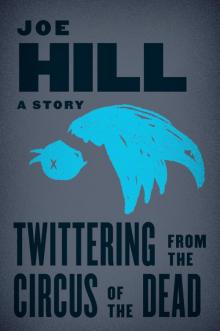 Twittering From the Circus of the Dead
Twittering From the Circus of the Dead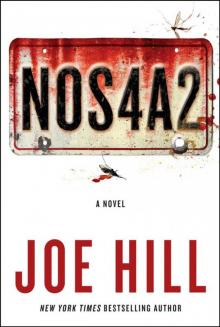 Nos4a2
Nos4a2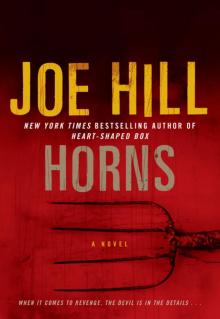 Horns
Horns Heart-Shaped Box
Heart-Shaped Box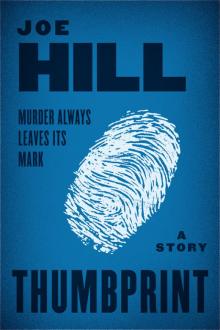 Thumbprint: A Story
Thumbprint: A Story Strange Weather
Strange Weather 20th Century Ghosts
20th Century Ghosts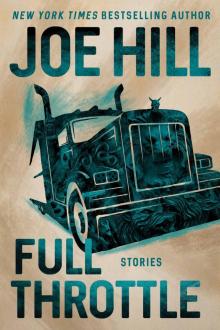 Full Throttle
Full Throttle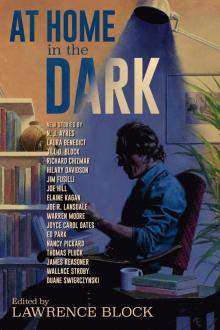 At Home in the Dark
At Home in the Dark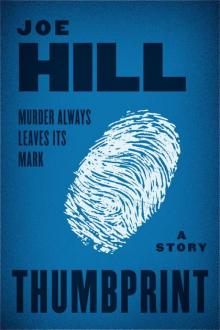 Thumbprint
Thumbprint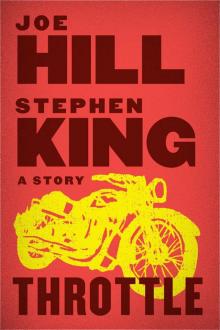 Throttle
Throttle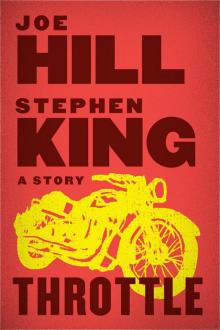 Throttle (Kindle Single)
Throttle (Kindle Single) The Best American Science Fiction and Fantasy 2015
The Best American Science Fiction and Fantasy 2015 Heart-Shaped Box with Bonus Material
Heart-Shaped Box with Bonus Material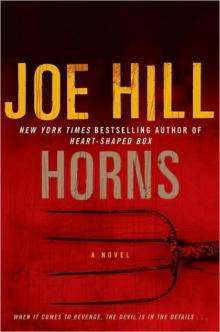 Horns: A Novel
Horns: A Novel